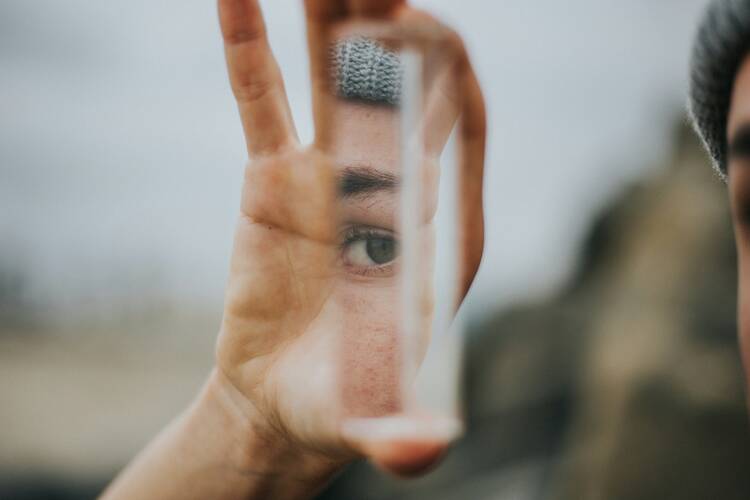A Reflection for the Memorial of St. John Chrysostom, Bishop and Doctor of the Church
Find today’s readings here.
In my work at Outreach with L.G.B.T.Q. Catholics, name-calling and finger-pointing from energetic critics and self-appointed defenders of the faith is an occupational hazard. Without providing an exhaustive list of slurs and epithets I’ve read, my colleagues have beentargeted for a torrent of vulgar messages—the disturbingly commonplace result of urging “respect, compassion and sensitivity” for L.G.B.T.Q. people in the church.
Of course, there are many reasons for this phenomenon: our hyper-polarized public discourse, a centuries-long religious prejudice against L.G.B.T.Q. people, the relative anonymity of social media and a political moment that prizes combat over compromise, argument over agreement. “And everybody’s shouting, ‘Which side are you on?’” sings an agitated Bob Dylan.
In his March 2023 essay on the perils of polarization, Sam Sawyer, S.J., the editor in chief of America, sought to help diagnose what ails us—and provide a challenge to us all. “Can we recognize each other within the bonds of communion, or have we already decided in advance that a sister or brother is a threat to the truth […] rather than a fellow pilgrim searching for it?” he asked. “Are we so convinced we are right that we enter into conversation principally to demonstrate how others are wrong?”
To be clear, my point is not to suggest discarding your convictions in a surrender to “unity,” or to bemoan the important pastoral work of making space for L.G.B.T.Q. Catholics, many of whom represent the most devout believers I’ve encountered. Opposition comes with the territory; it is simply a distraction from the greater good. But today’s Gospel narrative, taken from Jesus’s Sermon on the Plain (Lk. 6:20-49), has something to say about focusing on the perceived moral failings of others as the starting point for Christian living.
In a sermon riddled with difficult sayings (“Woe to you when everyone speaks well of you,” “Love your enemies, do good to those who hate you”), Jesus asks his disciples an uncomfortable question.
“How can you say to your brother, ‘Brother, let me remove that splinter in your eye,’ when you do not even notice the wooden beam in your own eye?” says Jesus. “You hypocrite! Remove the wooden beam from your eye first; then you will see clearly to remove the splinter in your brother’s eye” (Lk. 6:42). Jesus shares similar sentiments during his Sermon on the Mount. “Do not judge, or you too will be judged,” he warns (Mt. 7:1).
The esteemed New Testament scholar Joseph A. Fitzmyer, S.J., interprets Jesus’ words as directing his disciples towards “honest self-evaluation and serious self-improvement.” Plainly put, we Christians must take stock of our own faults before harping on what we consider the sins of our neighbors. With a wooden beam lodged in our eye—a striking, painful image—we are blind to our own ethical errors and in no position to judge others. This connects to Jesus’ earlier question in the same passage: “Can a blind person guide a blind person?” (Lk. 6:39).
Social media and other forms of modern technology have streamlined our ability to discover and denounce the alleged wrongdoing of strangers, but these powerful tools have done little to encourage self-reflection first. We look outwards as through a one-way virtual mirror without permitting the light back in. Our screens are contradictions: They both reflect and obscure. But Jesus challenges us to start with ourselves before throwing stones (Jn. 8:7).
In a groundbreaking 2013 interview with America, Pope Francis sought to model this posture. When asked “Who is Jorge Mario Bergoglio?” the pope responded: “I am a sinner. This is the most accurate definition.” Francis’ statement is not faux humility or public self-pity. It is a personal recognition of human imperfection as called for by Christ.
Fitzmyer notes that Jesus’ teaching does not prohibit us from naming injustice and immorality when we see it, “but they proscribe attempts to make others better without a similar and prior application of such judgments to oneself.”
In summary, begin with yourself before you press send.








